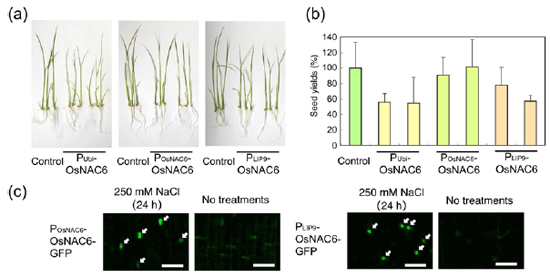Improvement of stress tolerance of rice plants utilizing stress-responsive promoters and transcription factors of rice
Description
Plants control a variety of stress tolerant genes and survive under stress conditions such as drought, etc. As transcription factors control many kinds of stress-inducible genes, the genes for transcription factors are thought to be useful towards improving transgenic tolerance.
In this research, we study the rice transcription factor OsNAC6 which accumulates under environmental stresses such as drought. The OsNAC6 gene is a member of the NAC transcription factor gene family in rice. Expression of OsNAC6 is induced by abiotic stresses, including cold, drought and high salinity. OsNAC6 gene expression is also induced by wounding and blast disease. A transactivation assay using a yeast system demonstrated that OsNAC6 functions as a transcriptional activator, and transient localization studies with OsNAC6-sGFP fusion protein revealed its nuclear localization.
Transgenic rice plants over-expressing OsNAC6 constitutively exhibited growth retardation and low reproductive yields (Fig. 1). These transgenic rice plants showed an improved tolerance to dehydration and high-salt stresses, and also exhibited increased tolerance to blast disease. By utilizing stress-inducible promoters, such as the OsNAC6 promoter, it is hoped that stress-inducible over-expression of OsNAC6 in rice can improve stress tolerance by suppressing the negative effects of OsNAC6 on growth under normal growing conditions (Fig. 1 and Fig. 2). The results of the microarray analysis revealed that many genes which are inducible by abiotic and biotic stresses were upregulated in rice plants over-expressing OsNAC6. A transient transactivation assay showed that OsNAC6 activates the expression of at least two genes, including a gene- encoding peroxidase.
Collectively, these results indicate that OsNAC6 functions as a transcriptional activator in response to abiotic and biotic stresses in plants. We conclude that OsNAC6 may serve as a useful biotechnological tool for the improvement of stress tolerance in various kinds of plants.
Figure, table
-
-
Fig. 2
Transgenic rice plants expressing the OsNAC6 gene controlled by stress-inducible promoters showed improved stress tolerance, such as high-salt stress tolerance of the POsNAC6-OsNAC6 plants and the PLIP9-OsNAC6 plants. The 14-day-old plants were soaked in 250 mm NaCl solution for 3 days and transferred to a nutrient solution for 9-12 days. Representative POsNAC6-OsNAC6 line (b), PLIP9-OsNAC6 line (c) and control rice plants (a) are shown. Plants on the left of the bar survived, whereas those on the right died.
- Affiliation
-
Japan International Research Center for Agricultural Sciences Biological Resources Division
- Classification
-
Technical A
- Term of research
-
FY2007(FY2004~2011)
- Responsible researcher
-
NAKASHIMA Kazuo ( Biological Resources Division )
ITO Yusuke ( Biological Resources Division )
MARUYAMA Kyonoshin ( Biological Resources Division )
YAMAGUCHI-SHINOZAKI Kazuko ( Biological Resources Division )
- ほか
- Publication, etc.
-
Nakashima, K., Tran, L.-S., Van Nguyen, D., Fujita, M., Maruyama, K., Todaka, D., Ito, Y., Hayashi, N., Shinozaki, K. and Yamaguchi-Shinozaki, K. (2007): Functional analysis of a NAC-type transcription factor OsNAC6 involved in abiotic and biotic stress-responsive gene expression in rice. Plant J. 51: 617-30.
- Japanese PDF
-
2007_seikajouhou_A4_ja_Part8.pdf513.98 KB


